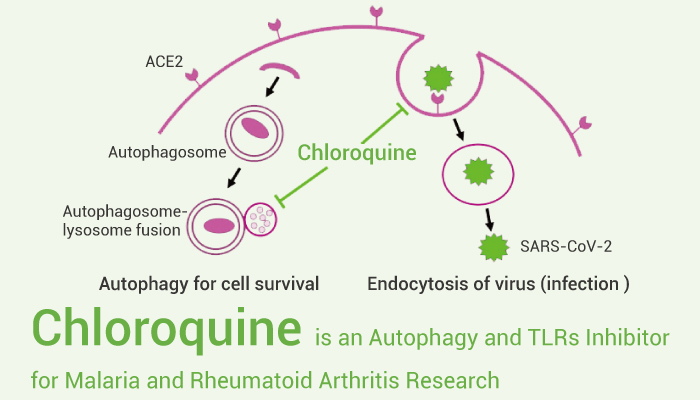Chloroquine is an antimalarial and anti-inflammatory agent widely used to treat malaria and rheumatoid arthritis. Intersetingly, Chloroquine not only a excellent anti-inflammatory agent, but also demonstrates more activities about cancer, SARS-CoV-2, ect.
First of all, Chloroquine is an autophagy inhibitor. Autophagy plays an emerging role in immune responses against intracellular pathogens and regulates distinct immunologic processes, important for the initiation of potent innate or adaptive immune responses. Indeed, there are studies support a correlation between a malfunction of autophagy-related genes and increased susceptibility to Crohn’s disease.
Secondly, Chloroquine is a toll-like receptors (TLRs) inhibitor. TLRs play a crucial role in immunity against microbial pathogens. Moreover, there is evidence suggests that TLRs may also be important in pathogenesis of chronic liver disease.
Besides, there are studies demonstrate that Chloroquine is an available weapons to fight COVID-19.

Chloroquine is an autophagy/TLRs/SARS-CoV-2 inhibitor.
Chloroquine (CHQ, 20 μM) inhibits IL-12p70 release and reduces Th1-priming capacity of activated human monocyte-derived Langerhans-like cells (MoLC). Moreover, Chloroquine (20 μM) enhances IL-1-induced IL-23 secretion in MoLC and subsequently increases IL-17A release by primed CD4+ T cells. Besides, Chloroquine blocks virus infection by increasing endosomal pH required for virus/cell fusion, as well as interfering with the glycosylation of cellular receptors of SARS-CoV. In addition, Chloroquine (0.01-100 μM; 48 hours) potently blocks virus infection (vero E6 cells infected with SARS-CoV-2) at low-micromolar concentration (EC50=1.13 μM).
In vivo, Chloroquine significantly inhibits tumour growth in the mouse xenograft model. Moreover, Chloroquine significantly inhibits HCC development in the DEN/NMOR rat model.
As an autophagy/TLRs/SARS-CoV-2 inhibitor, Chloroquine has the potential for many research areas. There are studies shows that Chloroquine also can be used in the study of infections with intracellular micro-organisms.
That’s to say, Chloroquine is an important mall molecule, which has more possibilities waiting for us to explore.
Reference:
[1] Said A, et al. J Immunol. 2014 Dec 15;193(12):6135-43.
[2] Tuomela J, et al. Oncol Lett. 2013 Dec;6(6):1665-1672.
[3] Mohamed FE, et al. Liver Int. 2015 Mar;35(3):1063-76.